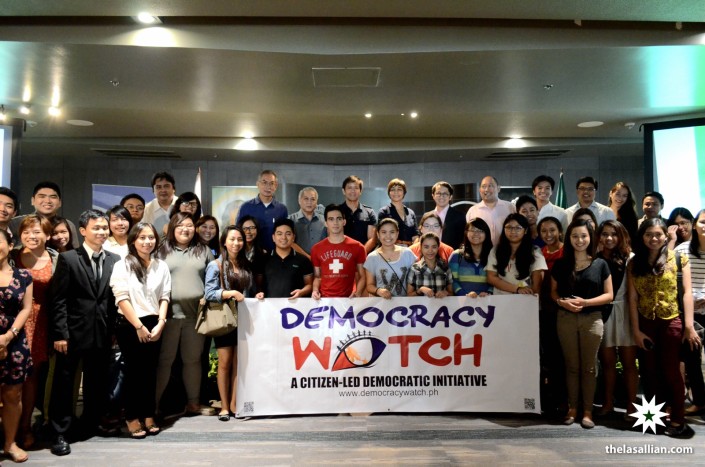After all is said and done, there is no other solution but to abolish the pork barrel.
This was the message of Bantay PDAF, a seminar spearheaded by student organization Poliscy in cooperation with Stratbase Research Institute’s Democracy Watch and the Commission on National Issues and Concerns, held at Henry Sy, Sr. Hall the afternoon of October 25.
Adopted from the former American practice of allocating pork barrel, the Philippine version of this discretionary lumpsum has turned into a profitable syndicate for corrupt government officials — from the Local Development Fund, to the Php 2.3 billion under the Countrywide Development Fund in 1990, to the present-day Php 24 billion PDAF.
The most recent expose spotlighted businesswoman Janet Napoles and the PDAF, who allegedly funneled Php 10 billion worth of public funds into favored legislators’ bogus projects and NGOs.
Amid public outrage, guest speaker and Executive Director of the Transparency and Accountability network Vincent Lazatin saw a silver lining, calling the recent scandal “a gift to all the reformers,” highlighting that the controversy led to citizens’ involvement towards ousting large-scale corruption within the Philippine government.
A system of patronage
Director of Institute of Political and Electoral Reform and Chairperson of Consortium of Electoral Reforms Ramon Capisle also believes that the PDAF is simply one manifestation of the problems in the Philippine political system, citing allegations that mastermind Napoles may be just one of the many cogs in the long-operating machinery of corruption.
He states that the root of it is patronage, best depicted by former President Ferdinand Marcos and his cronyism. This elite system retained, even into the term of his successor and Philippine democracy’s mother, Corazon Aquino.
Lazatin highlights the cultural role of patronage. He explains that legislators and executive officials are tied in an interdependent relationship. Furthermore, legislators tend to spend pork on immediate projects; personal service and favors towards their constituents. This is often used to heighten their reelection potential.
As constituents, Filipino citizens become beholden to these officials. Like Casiple, Lazatin believes that this type of patronage in the government perpetuates corruption, especially in the case of the PDAF.
“Let’s go beyond pork barrel. Let’s address the system,” Lazatin attests, holding that the problem of PDAF does not lie on reformation of the funding system itself, but the abolition of pork barrel funds in any form.
Other problems
University of the Philippines professor emeritus Randy David also observes that the PDAF violates the separation of powers in the government. He analyzed that by allowing legislators to fully participate in the implementation of their PDAF-funded projects, it mixes the roles of the legislative branch and the executive branch, making the discretionary fund highly exploitable.
David urges that the judiciary branch of the Philippine government be cleaned of syndicated fixers similar to Napoles, and to depoliticize and professionalize the Philippine bureaucracy.
Political activist and founder of Million People March Peachy Bretaña strongly believes that any kind of pork barrel should be excluded in the General Appropriations Act of 2014, which dictates the country’s annual budget.
She asserts the urgent need for the Freedom of Information bill, a public audit and that Congress deliberations be made publicly viewable.
In the end, David believes that patronage politics starts and ends at mass poverty, which is perpetuated by an unreliable economy and a lack of education. Furthermore, he advocates electoral reform and democracy through local units such as barangays.
On the role of active citizenship
“Within your means, how far can you take it?” Bretaña asks. Through mobilization in social media, Bretaña believes in the power of reform through Filipino citizens.
“Social media is an equalizer for ordinary people who have no access to powerful mainstream media,” said Bretaña, who harnessed the potential of social media and founded the Million People March, the ongoing series of protests calling for the total abolition of PDAF alongside government transparency and accountability.
Quoting Professor David, she notes that massive protest actions nowadays stem from a casual comment on the internet. Bretaña started highlighting the little ways ordinary citizens could help in the battle against corruption, through the abolishment of the PDAF.
“Convince the ones who don’t think they’re affected, especially to your immediate environment,” Bretana said. “Beyond that is that you should not be tired of fighting,” she adds.
She shared that they are trying to appeal to congress, for she believes that the Congress can independently abolish PDAF. She believes that we could take advantage of pressuring the Congress through mass actions, like demonstrations, letters, e-mails and text blasts. “Sakanila pa lang pwede na,” Bretana insists. “Kulitin, ng kulitin, ng kulitin.”
Beyond using social media, Bretaña recognizes the need for mainstream media to help a wider audience, and encourages the citizenry to unite in this cause: “We need mainstream media to help us understand how the pork barrel fund robs us of our own rights and our own money… It is time to rip our system of patronage politics, which the pork barrel reinforces. It is our right to demand that it be scrapped.”
Lazatin affirms that engagement of concerned citizens plays a vital role in the issue. Above all, he adds that people should ensure that they understand the real issue, and should keep the discussion going… if people let the issue die, then no solution will be served.
Bretaña concludes, “This is the essence of the Million People March, and it will stay that way. Never, ever forget about this: Hindi ang mga mambabatas ang boss. Tayo ang boss.”


One reply on “Thought leaders and students converge in Bantay PDAF”
.
tnx!!